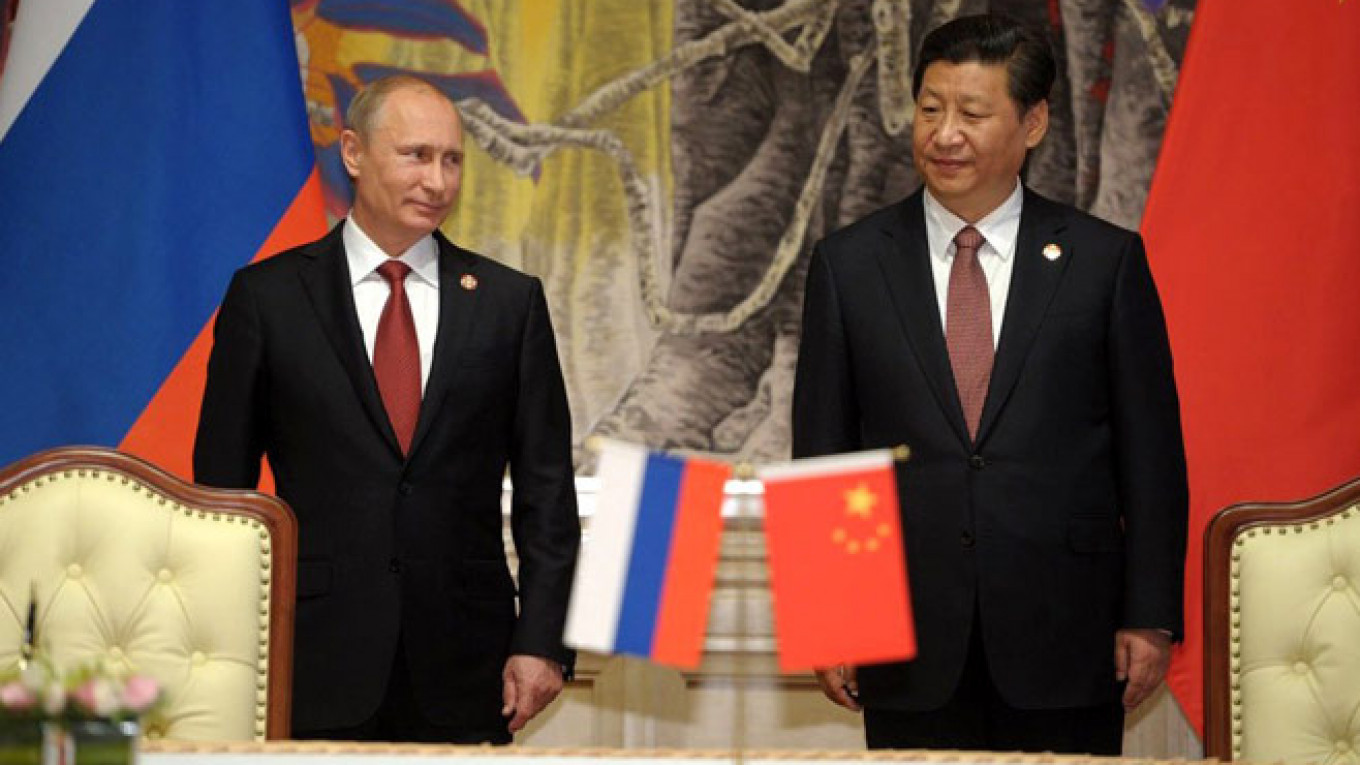President Vladimir Putin will be one of the most noteworthy guests at Chinese celebrations to mark the end of World War II when he arrives in Beijing on Wednesday, even as fraying economic ties between the two giant countries undermine the Kremlin’s “pivot to the East.”
The Russian delegation is expected to enjoy a prominent position at a huge military parade in the Chinese capital on Thursday followed by talks between Putin and his Chinese counterpart, Xi Jinping.
“The main aim of the visit is political symbolism,” said Vladimir Petrovsky, an expert on China at Russia’s Academy of Sciences’ Institute of the Far East.
Russia has emphasized developing political and economic ties with China since last year’s Ukraine crisis began to sour relations with the West, but the apparent fit between Russia’s raw materials and China’s rapid growth has been undermined by economic problems on both sides of the Chinese-Russian border.
Your Parade, My Parade
The presence of Putin in the stands at the parade in Beijing will echo the Kremlin’s extravagant military display to commemorate the 70th anniversary of the surrender of Nazi Germany on May 9 that was attended by Xi but snubbed by most Western leaders.
Russian soldiers will join more than 10,000 Chinese troops marching through central Beijing. But, like in Moscow earlier this year, there will be few Western heads of state visible in the stands — many snubbed the event because of military tensions in the region, while news agency Reuters reported last week that others were put off by the presence of Putin.
In an interview to Russian state news agency TASS on Tuesday, Putin criticized those downplaying Chinese and Soviet contributions to ending World War II.
“Today in Europe and in Asia we see attempts to falsify the history of World War II, put forward unsubstantiated, distorted accounts of events not based on the facts,” Putin said, according to TASS.
“Our countries were allies in the battle with Nazism and Japanese militarism and we took the aggressors’ main blow. And we didn’t just hold out in this terrible conflict, but emerged victorious, freed enslaved peoples and brought peaceful life to the world,” Putin said, TASS reported.
Accompanying Putin will be a large delegation of Russian officials and businessmen including Energy Minister Alexander Novak, Deputy prime ministers Igor Shuvalov and Dmitry Rogozin, Foreign Minister Sergei Lavrov, Defense Minister Sergei Shoigu, the heads of oil giant Rosneft and gas behemoth Gazprom as well as top bankers and billionaire Gennady Timchenko, a close acquaintance of Putin.
Gas Debacle?
Kremlin adviser Yury Ushakov said Monday that more than 30 agreements will be signed with China during the official visit, but the only one he gave details for was a memorandum between Gazprom and state-owned China National Petroleum Corporation to increase natural gas supplies via the Far East.
The size of the deliveries is still under discussion, the RBC news website reported Monday, citing a Gazprom official.
Suggestions earlier this year by officials that Putin’s visit would see a final agreement about gas deliveries to China via a new “Western” pipeline through the Altai republic were scuppered by Ushakov on Monday. Such a document is “unlikely” to be signed, Ushakov said, according to TASS.
After more than a decade of talks, Putin announced a landmark $400 million gas supply deal to China last May — the first time Russia will sell pipeline gas to a non-European country. The accord followed a deterioration of relations with Europe and the U.S. as the Ukraine crisis deepened.
But Gazprom recently confirmed that the price China pays for the gas is tied to the oil price, which has more than halved over the last year. “This may end up being one of Gazprom’s most misjudged investment decisions to date,” analysts at Sberbank CIB said last month.
Gazprom said last week that supplies of the fuel to China under the 2014 agreement might not start until 2021, two years after the launch date originally announced.
While it remains the world’s biggest consumer of energy, experts predict that China’s demand for new energy deals will be dampened by concerns that a period of rapid growth is ending.
Economic Storm Clouds
Battered by the falling oil price and a dramatic decline in the value of Russia’s currency, the flow of goods between Russia and China has slowed significantly — although China remains Russia’s biggest trading partner.
In the first six months of 2015, trade between the two countries, worth $88 billion in 2014, contracted by 28.7 percent compared to the same period the year before.
The two sides have said they are targeting a trade turnover of $200 billion by 2020 — a goal that is looking more and more unfeasible.
“Russian-Chinese economic cooperation has reached a certain technical limit … it is difficult for both countries to increase the size of their trade or diversify,” said Mikhail Karpov, a Moscow-based China expert and political scientist. “There is less optimism about the economic side of things.”
Contact the author at h.amos@imedia.ru
A Message from The Moscow Times:
Dear readers,
We are facing unprecedented challenges. Russia's Prosecutor General's Office has designated The Moscow Times as an "undesirable" organization, criminalizing our work and putting our staff at risk of prosecution. This follows our earlier unjust labeling as a "foreign agent."
These actions are direct attempts to silence independent journalism in Russia. The authorities claim our work "discredits the decisions of the Russian leadership." We see things differently: we strive to provide accurate, unbiased reporting on Russia.
We, the journalists of The Moscow Times, refuse to be silenced. But to continue our work, we need your help.
Your support, no matter how small, makes a world of difference. If you can, please support us monthly starting from just $2. It's quick to set up, and every contribution makes a significant impact.
By supporting The Moscow Times, you're defending open, independent journalism in the face of repression. Thank you for standing with us.
Remind me later.







